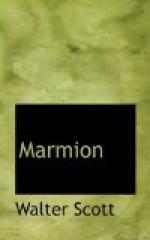And, oh! he had that merry glance,
That seldom lady’s heart resists.
Lightly from fair to fair he flew,
And loved to plead, lament, and sue;—
Suit lightly won, and short-lived pain, 240
For monarchs seldom sigh in vain.
I said he joy’d in banquet bower;
But, ’mid his mirth, ’twas often strange,
How suddenly his cheer would change,
His look o’ercast and lower, 245
If, in a sudden turn, he felt
The pressure of his iron belt,
That bound his breast in penance pain,
In memory of his father slain.
Even so ’twas strange how, evermore, 250
Soon as the passing pang was o’er,
Forward he rush’d, with double glee,
Into the stream of revelry:
Thus, dim-seen object of affright
Startles the courser in his flight, 255
And half he halts, half springs aside;
But feels the quickening spur applied,
And, straining on the tighten’d rein,
Scours doubly swift o’er hill and plain.
X.
O’er James’s heart, the courtiers say,
260
Sir Hugh the Heron’s wife held sway:
To Scotland’s Court she came,
To be a hostage for her lord,
Who Cessford’s gallant heart had gored,
And with the King to make accord,
265
Had sent his lovely dame.
Nor to that lady free alone
Did the gay King allegiance own;
For the fair Queen of France
Sent him a turquois ring and glove,
270
And charged him, as her knight and love,
For her to break a lance;
And strike three strokes with Scottish brand,
And march three miles on Southron land,
And bid the banners of his band
275
In English breezes dance.
And thus, for France’s Queen he drest
His manly limbs in mailed vest;
And thus admitted English
fair
His inmost counsels still
to share; 280
And thus, for both, he madly
plann’d
The ruin of himself and land!
And yet, the sooth
to tell,
Nor England’s fair,
nor France’s Queen,
Were worth one pearl-drop,
bright and sheen, 285
From Margaret’s
eyes that fell,—
His own Queen Margaret, who, in Lithgow’s bower,
All lonely sat, and wept the weary hour.
XI.
The Queen sits lone in Lithgow pile,
And weeps the weary day,
290
The war against her native soil,
Her monarch’s risk in battle broil:—
And in gay Holy-Rood, the while,
Dame Heron rises with a smile
Upon the harp to play.
295
Fair was her rounded arm, as o’er
The strings her fingers flew;




